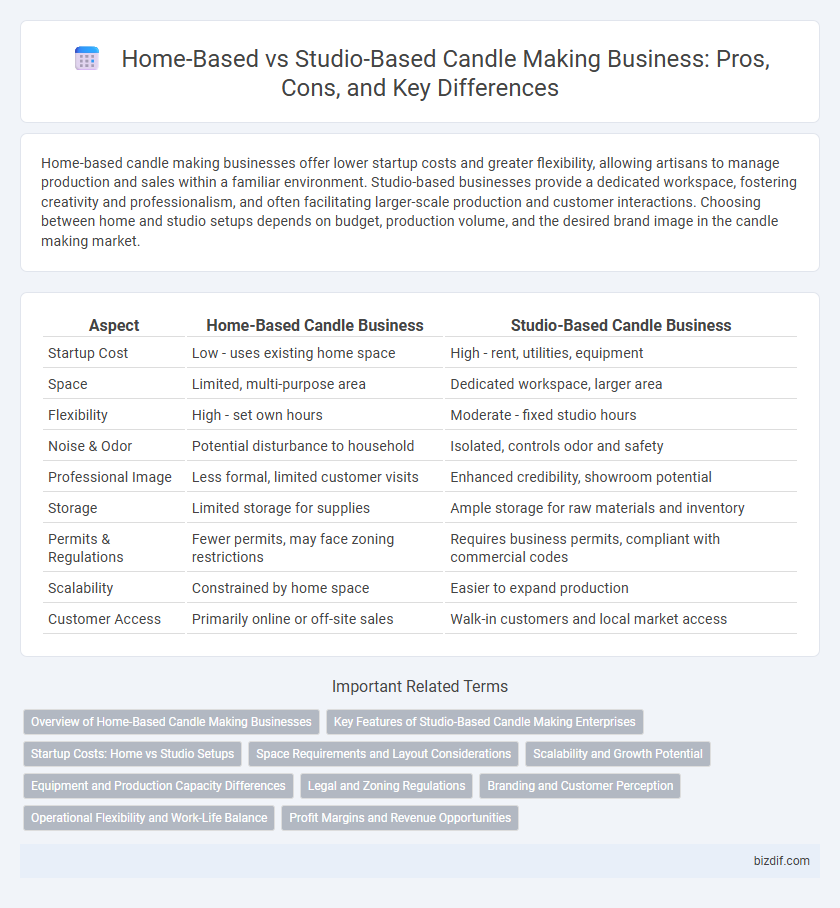Home-based candle making businesses offer lower startup costs and greater flexibility, allowing artisans to manage production and sales within a familiar environment. Studio-based businesses provide a dedicated workspace, fostering creativity and professionalism, and often facilitating larger-scale production and customer interactions. Choosing between home and studio setups depends on budget, production volume, and the desired brand image in the candle making market.
Table of Comparison
| Aspect | Home-Based Candle Business | Studio-Based Candle Business |
|---|---|---|
| Startup Cost | Low - uses existing home space | High - rent, utilities, equipment |
| Space | Limited, multi-purpose area | Dedicated workspace, larger area |
| Flexibility | High - set own hours | Moderate - fixed studio hours |
| Noise & Odor | Potential disturbance to household | Isolated, controls odor and safety |
| Professional Image | Less formal, limited customer visits | Enhanced credibility, showroom potential |
| Storage | Limited storage for supplies | Ample storage for raw materials and inventory |
| Permits & Regulations | Fewer permits, may face zoning restrictions | Requires business permits, compliant with commercial codes |
| Scalability | Constrained by home space | Easier to expand production |
| Customer Access | Primarily online or off-site sales | Walk-in customers and local market access |
Overview of Home-Based Candle Making Businesses
Home-based candle making businesses offer entrepreneurs a cost-effective way to start with minimal overhead, leveraging kitchen space and small-scale equipment for production. These businesses benefit from flexible hours and personalized product creation, allowing artisans to experiment with scents, molds, and packaging tailored to niche markets. Limited space and production capacity can constrain growth, but online platforms and local markets provide ample opportunities for direct consumer engagement and brand building.
Key Features of Studio-Based Candle Making Enterprises
Studio-based candle making enterprises typically feature specialized equipment such as larger melting pots and temperature controls, enabling higher production volumes and consistent quality. These businesses often benefit from dedicated workspace allowing for organized inventory management, better safety protocols, and efficient workflow design. Enhanced opportunities for customer interaction, including workshops or on-site retail, contribute to brand building and increased revenue streams within the studio setting.
Startup Costs: Home vs Studio Setups
Home-based candle making businesses feature lower startup costs due to reduced rent, utilities, and flexible space utilization, making them accessible for beginners and hobbyists. Studio-based setups require higher initial investments, including commercial rent, specialized equipment, and adherence to safety regulations, which can increase overhead but allow for larger-scale production. Entrepreneurs must weigh the affordability of home operations against the scalability and professional environment offered by studio spaces to determine the best fit for their business goals.
Space Requirements and Layout Considerations
Home-based candle making businesses require minimal space, often utilizing kitchen counters or small worktables, which suits low-volume production and flexibility. Studio-based setups demand larger, dedicated areas designed for efficient workflow, incorporating zones for melting, pouring, cooling, and packaging to optimize productivity. Proper layout in studio spaces enhances safety and organization, essential for handling hot wax and chemical fragrances.
Scalability and Growth Potential
Home-based candle making businesses benefit from lower overhead costs, allowing for gradual scalability with limited initial capital investment. Studio-based setups provide more space and professional equipment, enabling higher production capacity and faster growth potential through bulk orders and diversified product lines. Choosing a studio location often better supports expansion into wholesale markets and larger-scale distribution channels.
Equipment and Production Capacity Differences
Home-based candle businesses typically rely on compact equipment such as small melting pots, handheld wick starters, and limited workspace, which restricts production capacity to smaller batches. Studio-based candle makers invest in industrial-grade melters, automated pouring machines, and larger curing areas, enabling higher volume output and consistent product quality. The scale and sophistication of equipment directly influence the efficiency and scalability of candle production between home and studio environments.
Legal and Zoning Regulations
Home-based candle making businesses must adhere to local zoning laws and residential regulations, which often restrict commercial activities to ensure neighborhood safety and community standards are maintained. Studio-based businesses typically fall under commercial zoning, allowing greater flexibility in production scale, signage, and extended operating hours, but require compliance with more stringent safety codes and permits. Understanding and navigating these legal frameworks is crucial to avoid fines, business interruptions, and ensure long-term operational legitimacy.
Branding and Customer Perception
Home-based candle businesses often benefit from a cozy, artisanal image that appeals to niche markets seeking handcrafted authenticity. Studio-based operations project a more professional and scalable brand identity, enhancing customer trust through visible investment in dedicated workspaces. Clear branding aligned with the production environment shapes customer perception and influences purchasing decisions in the competitive candle market.
Operational Flexibility and Work-Life Balance
Home-based candle making businesses offer greater operational flexibility by allowing entrepreneurs to set their own schedules and reduce commuting time, enhancing work-life balance. Studio-based businesses provide dedicated space with specialized equipment, benefiting production scale but requiring more rigid hours and potential travel, which may impact personal time. Balancing operational needs with personal lifestyle preferences is key to choosing the appropriate setup for candle makers.
Profit Margins and Revenue Opportunities
Home-based candle making businesses often benefit from lower overhead costs, resulting in higher profit margins despite limited production capacity. Studio-based businesses typically have greater revenue opportunities due to increased workspace for larger batches, allowing for bulk orders and custom projects. Balancing operational expenses with scale potential is crucial for optimizing profitability in candle-making ventures.
Home-based business vs Studio-based business Infographic

 bizdif.com
bizdif.com